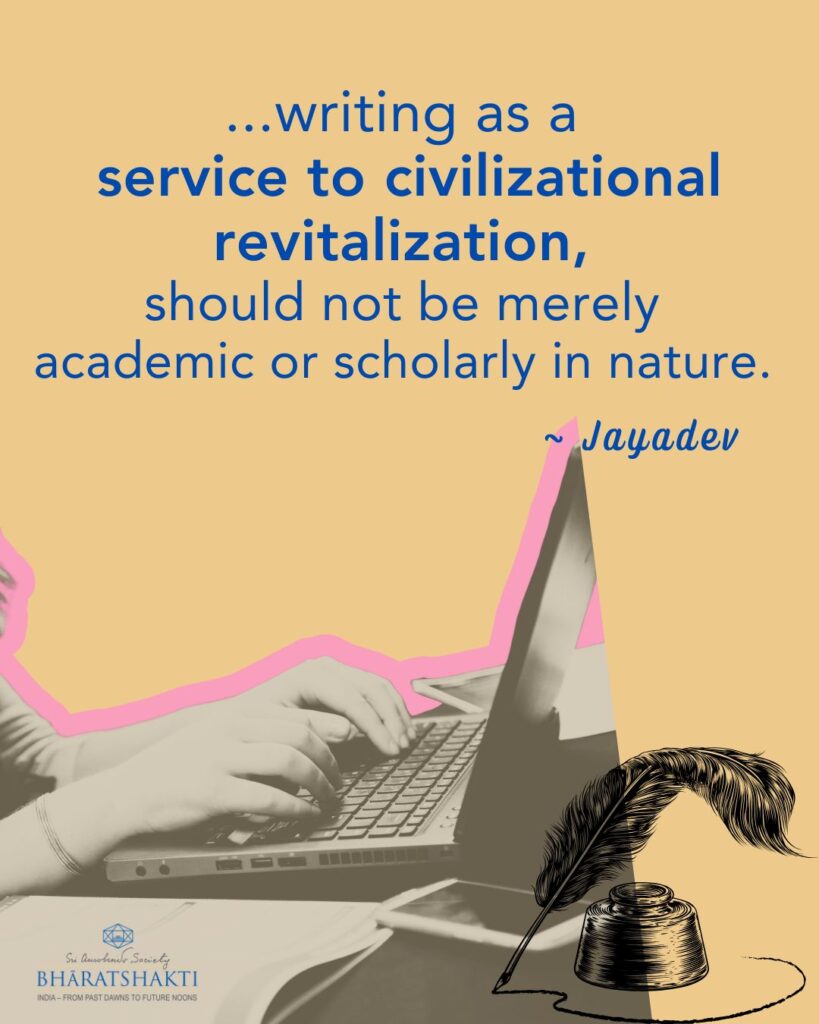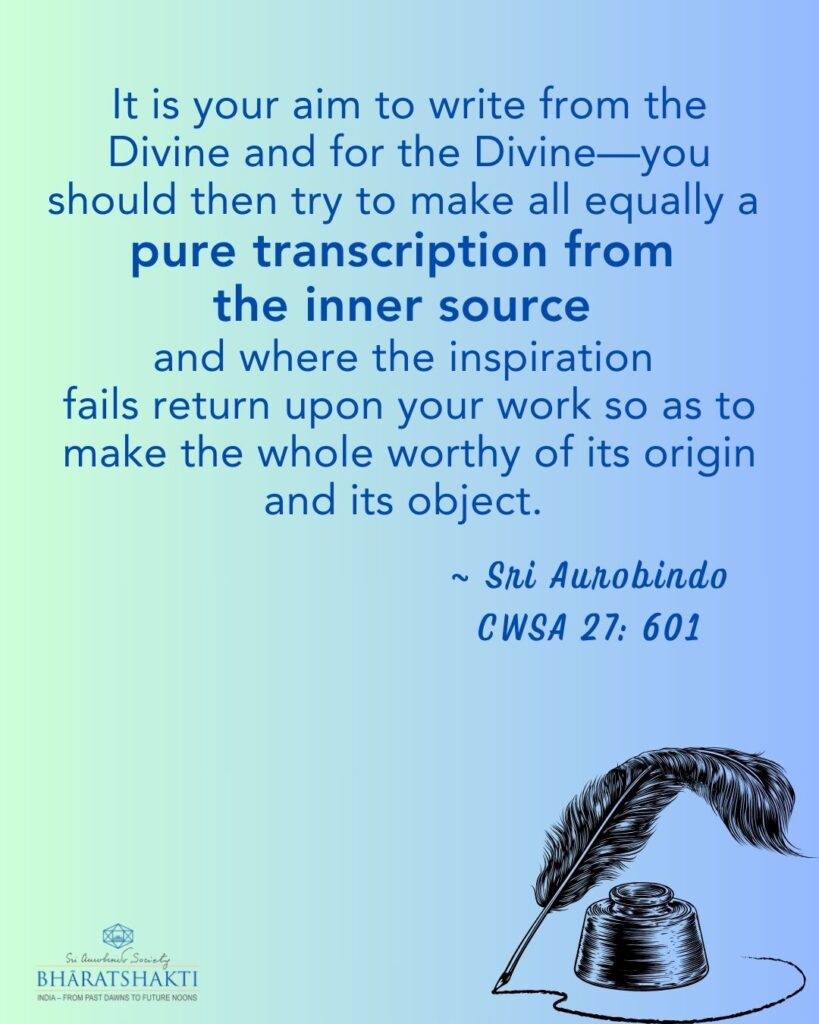Date: February 24, 2024
The written word is perhaps the most powerful medium for ideas in the manifest world. Seers talk of the various states of Vāk (speech), of which Vaikharī is the grossest and most tangible form, and yet only accounts for the spoken word. While the spoken word used in its full capacity can only influence a limited audience at a time, it is the written word that truly endures the vagaries of time. Therefore, in my eyes, the written Word is an expanded and enduring expression of Vaikhari Vāk.
The written words of the seers, inspire and illuminate the minds of humanity for centuries even beyond the disappearance of their mortal frames and their powerful speech. Even the Vedic Hymns (literally the Śruti), although in principle are “heard” and transmitted through “speech”, still owe their endurability and integrity of their preservation to the written word.
Sri Aurobindo, in his volume Letters on Poetry and Art, says –
“The Word has power—even the ordinary written word has a power. If it is an inspired word, it has still more power. What kind of power or power for what depends on the nature of the inspiration and the theme and the part of the being it touches. If it is the Word itself, – as in certain utterances of the great Scriptures, Veda, Upanishads, Gita, it may well have a power to awaken a spiritual and uplifting impulse, even certain kinds of realisation.”
~ CWSA, 27: 714
Given its immense power and potential, the written word and process of writing must be examined deeply, in the pursuit of the transmission, revitalization and recalibration of ideas, especially in the context of civilizational awakening.

With the considered view that the written word holds immense power, we must examine how such potential can also be wasted when its creation is not aligned with the Divine and its movements. It is my firm conviction, albeit a contested one, that writing as a service to civilizational revitalization, should not be merely academic or scholarly in nature.
Too much is stated within closed doors of the academia, too much is written and lost in the dusty corridors of the university libraries, and too much is heard from the mouths of those for whom letters are mere skeletons, bereft of life and a capacity to change. Here the creative potential of the Word appears dissipated, and in its dull, uninspired lifelessness, it is lost in the expanses of Ākāśa, the great Mahābhūta, which hosts all sounds. Of what use is that kind of written Word, which has only served the purpose of credibility and a certification of completion?
If writing must really produce change, it must be inspired from the inner Self and soaked in the nectar of Divine Will. Its sounds, meanings and written symbols must arise from the heart and overflow on to the paper, directed by that Divine Doer. Our Ideal much be the likes of the great beings like Bhagavatpāda Śaṅkara, Svāmī Vivekananda and Sri Aurobindo. Their words endure the harsh forgetfulness of time itself, for their words are true and in being so, endure.

The written word must be clear, easy to follow and yet grounded well in the civilizational ethos. Herein, we find that the writer and what is written become an instrument of the processes of civilization. The writing must have, as its pramāna, the Guru’s teachings, Śāstra’s declarations and the lived experience of the subject matter. In it lies authority and the prevention of all that is the product of mindless stipulation. Also, the writing must resonate at all levels, from a rank beginner to a seasoned ascetic. A writing that arises from authenticity must also embrace the variety of readership, for as far as the message is concerned, every reader is equally valuable.
The writer must adapt to changing languages, changing mediums and changing tastes of the readers. The very fact that you are more likely to see these words on a digital platform, and not a parchment paper, substantiates the point that is being made here. A defunct medium, however sacred or sacrosanct is liable to carry defunct ideas. Change, is thus inevitable for transmission.
Finally, and most importantly, if the writer has to be effective, he must necessarily be not only a sādhaka but also a rasika. One might argue that a writer need only be a man of experience and an effective wordsmith, but this is far from the truth. The process of writing that endures, involves the churning of the forces within, the result of which gives rise to both divine nectar and dangerous poison. For a writer to discard the poison, and share the nectar alone, he must necessarily be a sādhaka.
Also, in the process of sharing, he must enjoy the craft of converting thought into sound and from sound into word. This, however, is very much like the dance of expressions leading to the relishing of one’s own creative powers. In this sense, only a rasika, can truly write.
Writing as svadharma is a process of a deep self-reflection, resulting in the consequent sharing of the fruits as a naivedya for civilizational awakening. In so offering, the writer is also rewarded with an effacement of individual limitations, and a merging with that which is always awake – the Light that is Bhārat. By this sādhana of writing, a writer transcends and enters the heart of Bhārat, much like how our luminaries and heroes, have done so in the past.
Let us pray that we may all be blessed with the opportunity and the capacity to offer Mā Bhavānī Bhāratī, the blossoms from the ‘Akṣaravalli’ (the creeper of letters).
More on BhāratShakti Blog
About the author:
Jayadev is a sādhaka and writer with a deep interest in the spiritual traditions of Bhārat, especially in Kaśmira Śaiva Darśana. After receiving deeksha from his Sri Guru, he has been learning the primary texts of the Śāstra tradition. His primary area of interest is in exploring ways to integrate this Śāstra learning into his ‘lived experience’ and thus enjoying the fruits of Śaiva Upāsana. His writings also reflect this emphasis on practice and experience. He is also deeply passionate about learning and imbibing the teachings from various contemporary spiritual masters.
